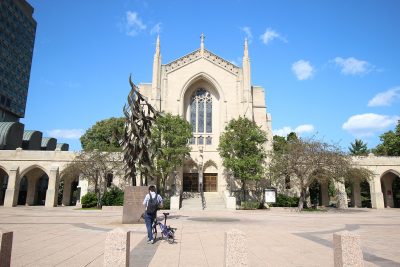The American college experience as we’ve known it has been flipped upside down. But high school students worldwide are still seeking it out.

Boston University’s Director of Undergraduate Admissions John McEachern said in a normal year, almost 50 percent of students are accepted through Early Decision. This year, he said they saw a 13 percent increase in the number of applicants applying Early Decision, though applications for ED two are still being processed.
“We’ve been over 5,000 [applications],” McEachern said, “which is a huge pool to consider for students who are part of the class.”
For regular decision, BU received more than 75,500 applications, which is a “significant” increase of 24 percent since last year, McEachern said.
He said BU processes applications using a “holistic approach,” part of which is understanding the whole situation — a commitment charged with a new weight in the pandemic.
“Holistic isn’t just looking at every part of the application,” McEachern said. “What makes it holistic is that students are considered within the context of their environment.”
High schools across the country treated the pandemic differently last spring McEachern said. The elements of an application the admissions officers would normally weigh — grades, extracurriculars and testing, for instance — were challenged due to the pandemic.
“All of this has probably snowballed to ramp up the anxiety that’s part of the college admissions process,” he said. “That’s been a big change for the students.”
He said BU adopted a test-optional policy for Fall 2021 and Spring 2022 admissions, similar to other universities such as Boston College and the University of California branches, which could have had an impact on the increasing number of applicants.
“Without that metric, I think students feel that there’s more uncertainty in the college admissions process,” he said. “That might be one of the contributing variables to the application submissions and the increase but … I don’t think that’s the only thing.”
For Franklin High School senior Natascha Nussbaum, who was admitted to BU’s College of Arts and Sciences in the Class of 2025, her last year and a half of high school was very different from her predecessors’.
After her school closed last spring, she said her senior year has involved in-person classes with some remote breaks.
“If our school’s population has a three percent positive rate, then the whole school shuts down for at least two weeks,” Nussbaum said, “which has happened twice now.”
Though BU was test-optional, other optional standardized tests, Nussbaum said, such as the Advanced Placement exams, did not go as she had planned.
“One of mine didn’t submit correctly the first time, because of issues with their website, it just shut down,” Nussbaum said, adding she had to retake it. “I’m sure I could have done better on those if I … knew how to navigate the website because that was a totally new experience.”
Pooja Somaru, who was admitted to BU’s CAS in ED one, is a senior at Brooklyn Technical High School. Somaru said the college application process was successful, but not without challenges, such as having to email a guidance counselor with a question instead of going in-person.
“I feel like college-apps wise, there wasn’t a lot of help,” Somaru said. “With school being online, it’s a little bit harder because you’re basically doing everything on your own.”
High schools also provided a place for information and support, and not just in the college application process, Somaru said.
“There used to be people from different colleges coming to my high school, and now we don’t have that at all,” Somaru said. “It was definitely finding out all this information on your own, and trying to seem interested in the school at the same time.”
Somaru said she visited BU over the summer for an unofficial tour, while Nussbaum said she attended her college tours virtually. BU also offers virtual tours for prospective students.
McEachern said the school has been proactive about creating virtual opportunities and connection for students in the absence of formal in-person visiting opportunities.
“We have done as much as humanly possible in terms of our recruitment and reaching out to folks,” he said. “It’s been our opportunity to connect with even more students.”
McEachern said though the college process may have heightened stress because of the pandemic, he wants students to know they will be okay.
“Every student that I talked to is going to have a landing place,” he said. “They’re going to have a place that they’re going to be excited to go and I think sometimes that gets lost when they’re in the process of applying to colleges.”
McEachern said the college process, while different mechanically because of COVID-19, has the same goal at its core: Find driven students who love BU and welcome them home.
“At the end of the day, what we’re trying to do is find students who are going to add value to the institution,” McEachern said, “who we can also support in their academic and professional and personal journeys.”
Rachel Do contributed to the reporting in this article.
























































































































